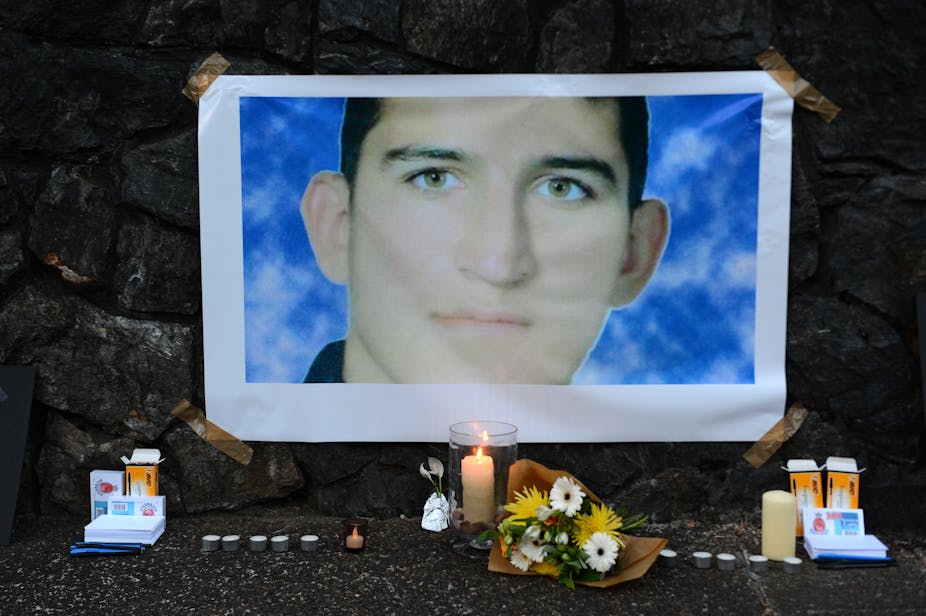The report on the issues leading up to and including the riots that took place in the Manus Island detention centre in February partially lifts the veil on the complex inner workings of offshore processing of asylum seekers and the human toll of Operation Sovereign Borders.
Conducted by Robert Cornall, the former secretary of the Attorney-General’s Department, and released by immigration minister Scott Morrison earlier this week, the report sets out the timeline of events that led to the riots which resulted in the death of Iranian man Reza Barati and injury to 62 others.
In setting out the wider security issues, the relationships between different parties involved in running the Manus Island centre and the apparent lack of information communicated to people held at the centre about their future prospects, the report raises critical questions about the long-term sustainability of offshore processing.
Security and management issues
As the report shows, multiple entities are involved in managing the centre under the co-ordination of the Department of Immigration and Border Protection (DIBP). In February, these included the security contractor G4S (staffed by PNG locals and expatriates), the Salvation Army, International Health and Medical Services as well as Papua New Guinea police.
PNG police are investigating criminal aspects of the riot, but overall accountability for management of the centres surely rests with the DIBP. It had contracted G4S to manage the centre’s security.
Findings from the report about unclear roles and responsibilities between some of these entities – most importantly the local police and G4S – need to be addressed by the DIBP, which has since replaced G4S with Transfield.
A recommendation that delays to criminal prosecutions for Barati’s death could lead to further tension should raise alarm. Of concern are other allegations about possible offences that have not been followed up. Surely the key lesson to be learnt from the riots is that due process must be followed in a timely manner for any criminal matters, whether responsibility rests with expatriate staff, local police or people in detention.
The review highlights limitations with the security-centred focus of centre management. Despite the considerable sum of money spent on securing detention centres – the government pays Transfield around A$61 million a month to run the facilities on Manus Island and Nauru – one might be shocked to read that a number of physical security arrangements were lacking.
Changing providers and increasing funding is not necessarily a guarantee of improvements if, as was revealed in the report, the DIBP continues to refuse requests for vital upgrades such as CCTV.
Another issue raised in the report is that many staff from G4S have simply moved across to work for Transfield. They may have a new badge, but the staff are likely to follow the same operating procedures and protocols. As the report recommends, Transfield should ensure that it has not hired staff who may be implicated in assaults on people in detention and, if it has done so, ensure they are dismissed.
Information gaps
Beyond security arrangements, the report notes significant gaps in information provided to people in detention about their claims, resettlement options and future prospects.
Leaving an information vacuum in a centre largely filled with young, single men was a potent mix that inflamed the already tense environment on Manus Island. Simple measures like logos on official communication, consistent messages and clear responses to requests should be the standard practice of the DIBP in line with its access and equity principles and service standards.
That it took a report to uncover frustrations among the detention centre population with communication measures is a sign of poor communication itself. Rectifying these problems, including offering copies of the report to people detained on Manus Island, will go some way to restore relationships not only between the DIBP and people in detention, but also between the security providers, the local community and police.

However, people in detention for the most part expected to reach Australia and seek asylum onshore. They never expected to find themselves in PNG in the first place. Battling with a reality quite different to their intentions, they were then informed that if found to be refugees they would be resettled in PNG, not Australia.
Making matters worse, arrangements for this resettlement process were not yet in place and were unclear. Despite current efforts to speed up resettlement, when faced with a double denial of making their claims for asylum in Australia, which gave them the chance to be settled in a country renowned for its settlement services and support, people in detention were bound to be frustrated and angry.
For people who are found not to be refugees, detail about the way removals and return will be handled is scant. This becomes even more complicated given the countries of origin of some people.
Before Australia instituted the Manus Island offshore processing centre, one of its first priorities should have been to put in place clear and transparent policies and procedures covering asylum to removal and return. Instead, this was left until much later and those in the centre paid a heavy price.
Findings come as no surprise
Many of the findings in the report will come as no surprise to those following asylum issues in Australia. Contracting out services, placing centres offshore and doing everything possible to deter people from seeking asylum in Australia might temporarily reduce numbers or displace movements. However, they do nothing to shift Australia’s responsibility for people who claim asylum in its territory.
While we continue to pay a heavy financial price for so-called border protection measures, asylum seekers pay an even heavier psychological price.
In Reza Barati’s case, no price can be put on the loss of his life. The Cornall report adds growing weight to the mounting evidence laying bare the futility of Australia’s deterrence-based immigration policies.

